AMD Zen 3 Ryzen Deep Dive Review: 5950X, 5900X, 5800X and 5600X Tested
by Dr. Ian Cutress on November 5, 2020 9:01 AM ESTCPU Tests: Synthetic
Most of the people in our industry have a love/hate relationship when it comes to synthetic tests. On the one hand, they’re often good for quick summaries of performance and are easy to use, but most of the time the tests aren’t related to any real software. Synthetic tests are often very good at burrowing down to a specific set of instructions and maximizing the performance out of those. Due to requests from a number of our readers, we have the following synthetic tests.
Linux OpenSSL Speed: SHA256
One of our readers reached out in early 2020 and stated that he was interested in looking at OpenSSL hashing rates in Linux. Luckily OpenSSL in Linux has a function called ‘speed’ that allows the user to determine how fast the system is for any given hashing algorithm, as well as signing and verifying messages.
OpenSSL offers a lot of algorithms to choose from, and based on a quick Twitter poll, we narrowed it down to the following:
- rsa2048 sign and rsa2048 verify
- sha256 at 8K block size
- md5 at 8K block size
For each of these tests, we run them in single thread and multithreaded mode. All the graphs are in our benchmark database, Bench, and we use the sha256 and md5 results in published reviews.
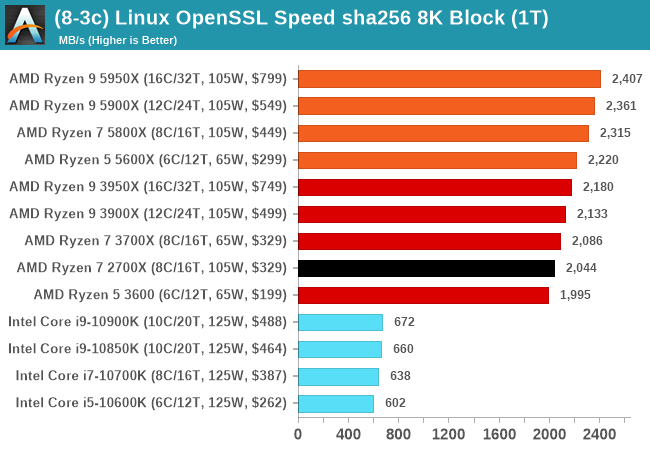
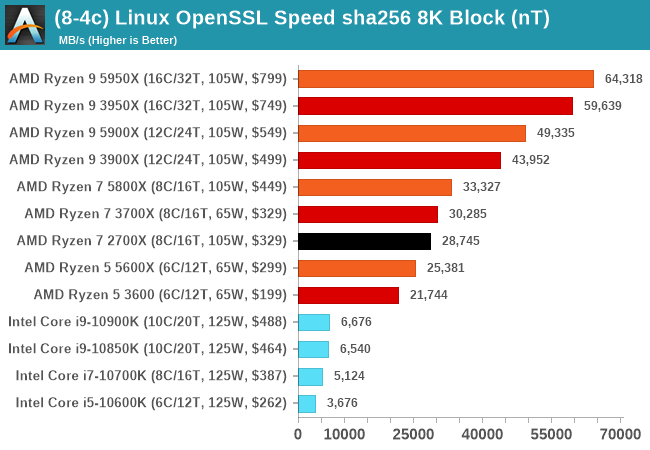
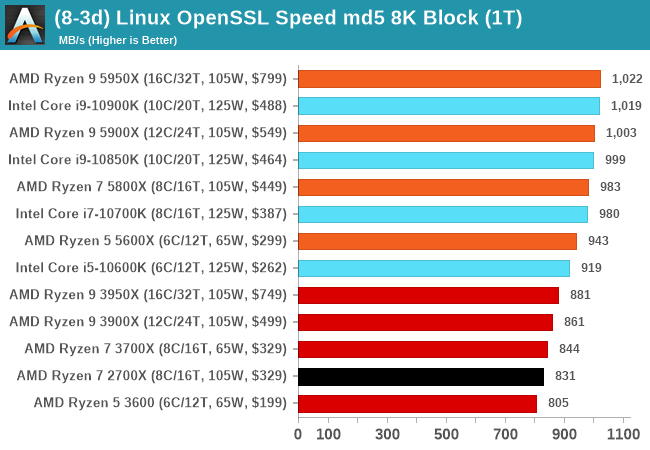
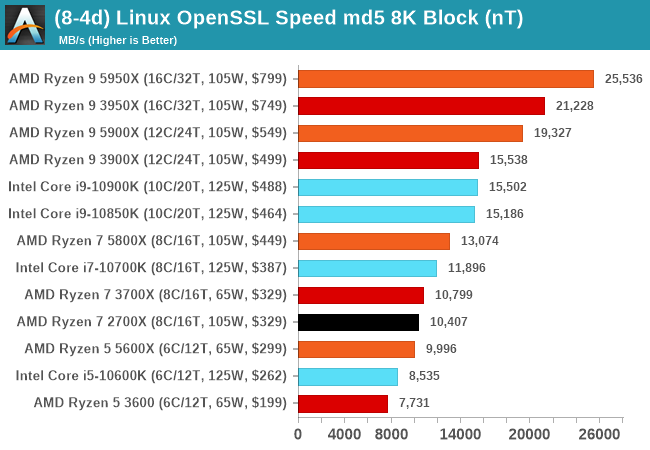
GeekBench 5: Link
As a common tool for cross-platform testing between mobile, PC, and Mac, GeekBench is an ultimate exercise in synthetic testing across a range of algorithms looking for peak throughput. Tests include encryption, compression, fast Fourier transform, memory operations, n-body physics, matrix operations, histogram manipulation, and HTML parsing.
I’m including this test due to popular demand, although the results do come across as overly synthetic, and a lot of users often put a lot of weight behind the test due to the fact that it is compiled across different platforms (although with different compilers).
We have both GB5 and GB4 results in our benchmark database. GB5 was introduced to our test suite after already having tested ~25 CPUs, and so the results are a little sporadic by comparison. These spots will be filled in when we retest any of the CPUs.
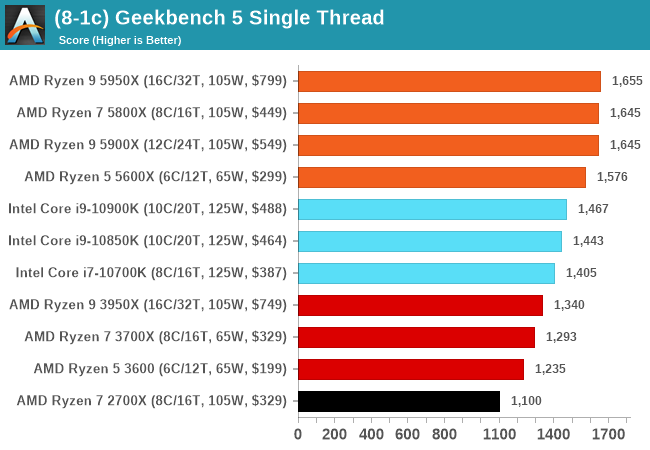
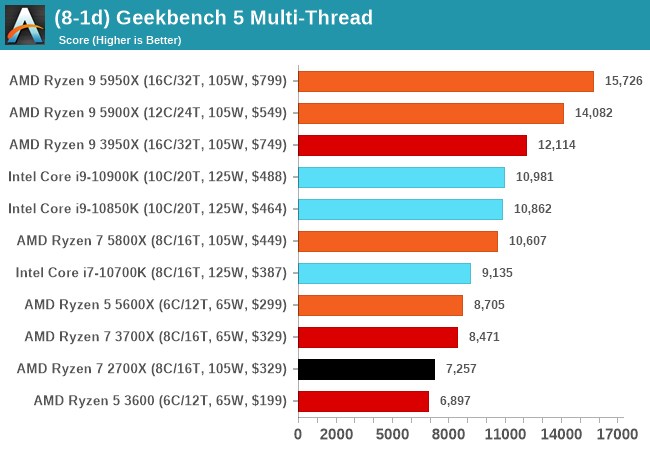










339 Comments
View All Comments
halcyon - Tuesday, November 10, 2020 - link
1. Ryzen 9 5xxx series dominate most gaming benhmarks in CPU bound games up to 720p2. However at 1440P/4K Intel, esp. 10850K pull ahead.
Can somebody explain this anomaly? As Games become more GPU bound at higher res, why does Intel pull ahead (with worse single/multi-thread CPU perf)? Is it a bandwidth/latency issue? If so, where exactly (RAM? L3? somewhere else)? Can't be PCIe, can it?
feka1ity - Saturday, November 14, 2020 - link
RAM. anandtech uses shitty ram for intel systemsMakste - Monday, November 16, 2020 - link
I think the game optimizations for intel processors become clear at those resolutions. AMD has been a none factor in gaming for so long. These games have been developed on and mostly optimised to work better on intel machinesSilma - Wednesday, November 11, 2020 - link
At 4K, the 3700X beats the 5600X quite often.Samus - Friday, November 13, 2020 - link
Considering Intel just released a new generation of CPU's, it's astonishing at their current IPC generation-over-generation trajectory, it will take them two more generations to surpass Zen 3. That's almost 2 years.Wow.
ssshenoy - Tuesday, December 15, 2020 - link
I dont think this article compares the latest generation from Intel - the Willow Cove core in Tiger lake which is launched only for notebooks. The comparison here seems to be with the ancient Skylake generation on 14 nm.abufrejoval - Friday, November 13, 2020 - link
Got my Ryzen 7 5800X on a new Aorus X570 mainboard and finally working, too.It turbos to 4850MHz without any overclocking, so I'd hazard 150MHz "bonus" are pretty much the default across the line.
At the wall plug 210 Watts was the biggest load I observed for pure CPU loads. HWinfo never reporting anything in excess of 120 Watts on the CPU from internal sensors.
"finally working": I want ECC with this rig, because I am aiming for 64GB or even 128GB RAM and 24x7 operation. Ordered DDR4-3200 ECC modules from Kingston to go with the board. Those seem a little slow coming so I tried to make do with pilfering some DIMMs from other systems, that could be shut down for a moment. DDR4-2133 ECC and DDR4-2400 ECC modules where candidates, but wouldn't boot...
Both were 2Rx4, dual rank, nibble not byte organized modules, unbuffered and unregistered but not the byte organized DIMMs that the Gigabyte documentation seeemd to prescribe... Asus, MSI and ASrock don't list such constraints, but I had to go with availability...
I like to think of RAM as RAM, it may be slower or faster, but it shouldn't be tied to one specific system, right?
So while I await the DDR4-3200 ECC 32GB modules to arrive, I got myself some DDR4-4000 R1x8 (no ECC, 8GB) DIMMs to fill the gap: But would that X570 mainboard, which might have been laying on shelves for months actually boot a Ryzen 5000?
No, it wouldn't.
But yes, it would update the BIOS via Q-Flash Plus-what-shall-we-call-it and then, yes, it did indeed recognize both the CPU and those R1x8 DIMMs just fine after the update.
I haven't yet tried those R2x4 modules again, because I am still exploring the bandwidth high-end, but I want to report just how much I am impressed by the compatibility of the AM4 platform, fully aware that Zen 3 will be the last generation in this "sprint".
I vividly remember how I had to get Skylake CPUs in order to get various mainboard ready for Kaby Lake...
I have been using AMD x86 CPUs from 80486DX4. I owned every iteration of K6-II and K6-III, omitted all Slot-A variants, got back with socket-A, 754, 939, went single, quad, and hexa (Phenom II x4+x6), omitted Bulldozer, but did almost every APU but between Kaveri and Zen 3, AMD simply wasn't compelling enough.
I would have gotten a Ryzen 9 5950x, if it had been available. But I count myself lucky for the moment to have snatched a Ryzen 7 5800X: It sure doesn't disappoint.
AMD a toast! You have done very well indeed and you can count me impressed!
Of course I'll nag about missing SVE/MKTME support day after tomorrow, but in the mean-time, please accept my gratitude.
feka1ity - Saturday, November 14, 2020 - link
Interesting, my default 9700k with 1080ti does 225fps avg - Borderlands 3, 360p, very low settings and anantech testers poop 175fps avg with 10900k and 2080ti?!? And this favoritize amede products. Fake stuff, sorry.Spunjji - Monday, November 16, 2020 - link
"Fake stuff"Thanks for labelling your post
feka1ity - Monday, November 16, 2020 - link
Fake stuff is not a label, it's a epicrisis. Go render stuff, spunji